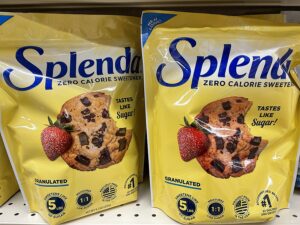Research from North Carolina University showed that Splenda leads to DNA breaks and leaky gut syndrome. The pharmacological name for Splenda is sucralose. The researchers found that Splenda undergoes metabolization into sucralose-6-acetate in the body. They tested the effect of sucralose-6-acetate on human cell lines in a Petri dish. The studies revealed that there was significant DNA damage as a result of the interaction of cells with sucralose-6-acetate. Sucralose-6-acetate is an intermediary chemical in the production of sucralose. As a result, there is a trace concentration of up to 0.67% sucralose-6-acetate in commercial sucralose samples. But with the digestion of sucralose there is a significant re-formation of sucralose-6-acetate. This also happens in rodents. Other research showed that fecal samples of rodents contained up to 10% sucralose-6-acetate relative to sucralose. This suggests that sucralose experiences acetylization in the intestines. The original research was published here
Sucralose-6-acetate causes leaky gut syndrome
Apart from the genotoxicity with DNA breaks the researchers also found that the tight junctions between gut cells broke down. This caused leakage of chemicals inside the gut to enter the general circulation. Susan Schiffman is the corresponding author of the study and an adjunct professor in the joint department of biomedical engineering at North Carolina State University and the University of North Carolina at Chapel Hill. She stated: “We found that gut cells exposed to sucralose-6-acetate had increased activity in genes related to oxidative stress, inflammation and carcinogenicity”. She went on to say: “A leaky gut is problematic, because it means that things that would normally be flushed out of the body in feces are instead leaking out of the gut and being absorbed into the bloodstream. We found that gut cells exposed to sucralose-6-acetate had increased activity in genes related to oxidative stress, inflammation and carcinogenicity.”
Discussion of the results
Dr. Schiffman pointed out that there must be consequences to this research. She summarized: “This work raises a host of concerns about the potential health effects associated with sucralose and its metabolites. It’s time to revisit the safety and regulatory status of sucralose, because the evidence is mounting that it carries significant risks. If nothing else, I encourage people to avoid products containing sucralose. It’s something you should not be eating.”
If I had a choice of consuming a sweetener that causes cancer and leaky gut syndrome (Sucralose) versus Stevia without any side effects, I would choose Stevia. As a matter of fact, I stopped Splenda in 2008 and have since taken Stevia as a sweetener. We have to be vigilant and pay attention to nutritional research.
Conclusion
New research noticed two flaws of a popular sweetener, sucralose (brand name Splenda). It caused genetic changes in the DNA of epithelial cells in vitro. The breakdown product sucralose-6-acetate also caused breakdown of the connections of gut cells leading to leaky gut syndrome. The first effect can cause various cancers. The second effect leads to poisoning of the body from toxic substances in the large intestine. The researchers suggest that the regulatory bodies should reassess the safety of sucralose. Unfortunately, it is now mixed into many low-calorie drinks and foods. In the meantime, it is a matter of “consumer, beware!”. Read labels and avoid buying any products where you detect sucralose as an ingredient. I followed my own advice since 2008 and replaced Splenda with stevia extract.







